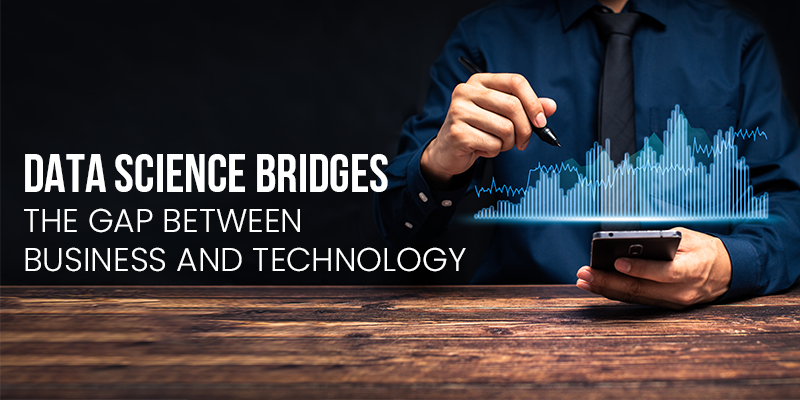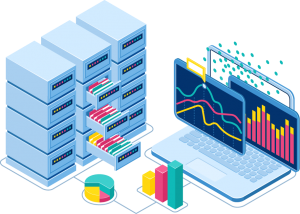Data Science Bridges the Gap between Business and Technology

Today, data science has become an integral part of enterprises as it helps to achieve a competitive edge over their competitors. Enterprises have to integrate data management technologies into their business and technology processes to streamline the business processes. Based on the research study conducted by Analytics India Magazine, the data analytics market size has increased to $45.4 billion in the financial year of 2021, which is a 26.5% growth than the previous year i.e. $35.9 billion.
Organizations recognized the power of data as it is crucial to leverage the power of data and to become competitive in the market. In today’s economy, every business process is data-driven. It applies to all organizations including small, medium, and multinational corporations. With the rise of Big Data, the importance of data has become more apparent in various industries. Data experts can tap potential information from structured and unstructured data that enable organizations to streamline various business processes.
Businesses that are not hiring data experts will be way behind the businesses that employ data professionals. To be successful in this competitive world, enterprises have to make use of the information from the available data.
According to Nasscom’s ‘Talent Demand & Supply Reports: AI & Big Data Analytics’, the estimated demand for AI and Big Data Analytics talents in India was -510,000 in 2018 and -800,000 in 2021. The talent demand and supply gap in AI and big data analytics is expected to grow from -62,000 to -140,000 in another three years.
The shortage of skilled professionals in big data analytics is followed by the lack of skilled professionals in technical architecture and AI. This shows a distinct gap between technology and business.

Role of Data Science in Technology and Business
Modern-time data analysts/data scientists/data experts are expected to have knowledge of programming languages such as SQL and Python as well as expertise in business-centric skills such as strategic thinking, problem-solving, and decision-making. In today’s business world, data experts also need to create or alter machine learning algorithms, visual art representations, and presentation principles.
To be precise, business analysts/data experts are expected to be all-in-one in the current business scenarios. They have the expertise of developers, coders, project managers, and technical experts. Hence, data scientists/data analysts are perfect for a plethora of job roles in various industries. These skillsets allow them to bridge the gap between the technological side and the business side of the enterprises.
Let’s discuss how data science/data analytics bridges the gap between businesses and technology.
Data Science in Cybersecurity
Businesses are using data points for developing superior products, better decision-making, and automating repetitive and time-consuming business processes. Businesses are also prone to frequent cyberattacks from hackers whose aim is to steal the sensitive data of organizations and disrupt business operations.
Why do organizations have to embrace big data analytics to protect their data?
Big data is known so because of the large data sets, and these huge data sets are difficult to process using traditional ways. Data analytics plays a key role here by providing practical and actionable insights as it extracts the right information by analyzing huge chunks of data.
Analytics experts use machine learning algorithms to support cybersecurity in the organization. The machine learning algorithms are used to identify uncommon data patterns and prevent them from entering into the system. Big data analytics helps in analyzing the past data of threat vectors, sorting out the uncommon behavioral patterns, and detecting new data.
Machine learning algorithms can identify a huge variety of threats, which can be performed by a data analytics professional and bridges the gap between technology and business.


Data Science in Retail Industry
When it comes to the retail sector, the majority of the business owners are incorporating emerging technologies that enable them to become competitive in the current marketplace. Since the retail industry has to meet customer demands, it has to stay abreast with technology. Data science acts as the savior in predicting data trends that help in making informed decisions.
Data science helps to develop solutions for businesses and anticipates or fulfills the needs of the customers. AI solutions like chatbots are used to personalize the shopping experience of the customers. Behavior analytics is used to ensure better conversion rates, increase revenue, reduce the cost of customer acquisition, reduce customer churn, and customize marketing campaigns.
Businesses can enhance customer experience using predictive analytics and by comparing customer data to provide product recommendations, leverage effective pricing strategy, boost conversion rates, conduct user-targeted promotions, etc.
The retail industry also leverages the benefits of data by monitoring social media trends that help to identify the most sought-after products. Businesses can rely on Natural Language Processing (NLP) and Machine Learning (ML) algorithms to extract useful information from social media.
With the help of data science, retailers can effectively deal with the fraudsters who abuse not only consumer rights but also cause credit damages. Fraudsters destroy business reputation as well as the trust of the customers. Data analytics, deep learning, and artificial neural network (ANN) solutions help in fraud detection to deal with fraudulent activities prevailing in the industry.
Data Science in Banking and Finance (BFSI)
BFSI sector is one of the several sectors that has been benefitted from data-driven insights. BFSI sector adopted data science, AI, and analytics when a global financial crisis emerged in 2008. Data science became a part of the BFSI sector when they realized the need for risk management and uses data for fraud detection, providing financial advice, forecasting, predicting market trends, customer segmentation, and identifying customer behavior.
Credit risk modeling in banking and finance industries helps them to develop new strategies for evaluating performance. With this, financial institutions evaluate the customer default rate and identify strategies to fortify their financial schemes. Data science and big data help the banking and finance industries to analyze the defaulters prior to loan sanctions.
Machine learning applications help in fraud detection and identifying transactional irregularities. It involves analyzing and monitoring user activity to investigate malicious data patterns.
Banking and finance industries are customer-oriented industries as customers are the backbone of the revenue inflow. Hence, they have to predict the future revenue based on past data. Customer retention also plays a role in generating future revenues. Data science has a crucial role in predicting the customer lifetime value, which is a requirement in the BFSI sector.
Data Science uses predictive analytics to analyze and categorize potential customers with future value so that the organization can invest resources in them.

Conclusion
Business and technology have become integral parts of a successful enterprise. Today, data science professionals bring a multitude of skills and knowledge beneficial for organizations in various sectors.
Develop a data-centric mindset to offer valuable insights to make your organization competitive over other businesses. An MBA in Business Analytics program helps you to develop a data-centric mindset and enables you to make a successful career transition.




